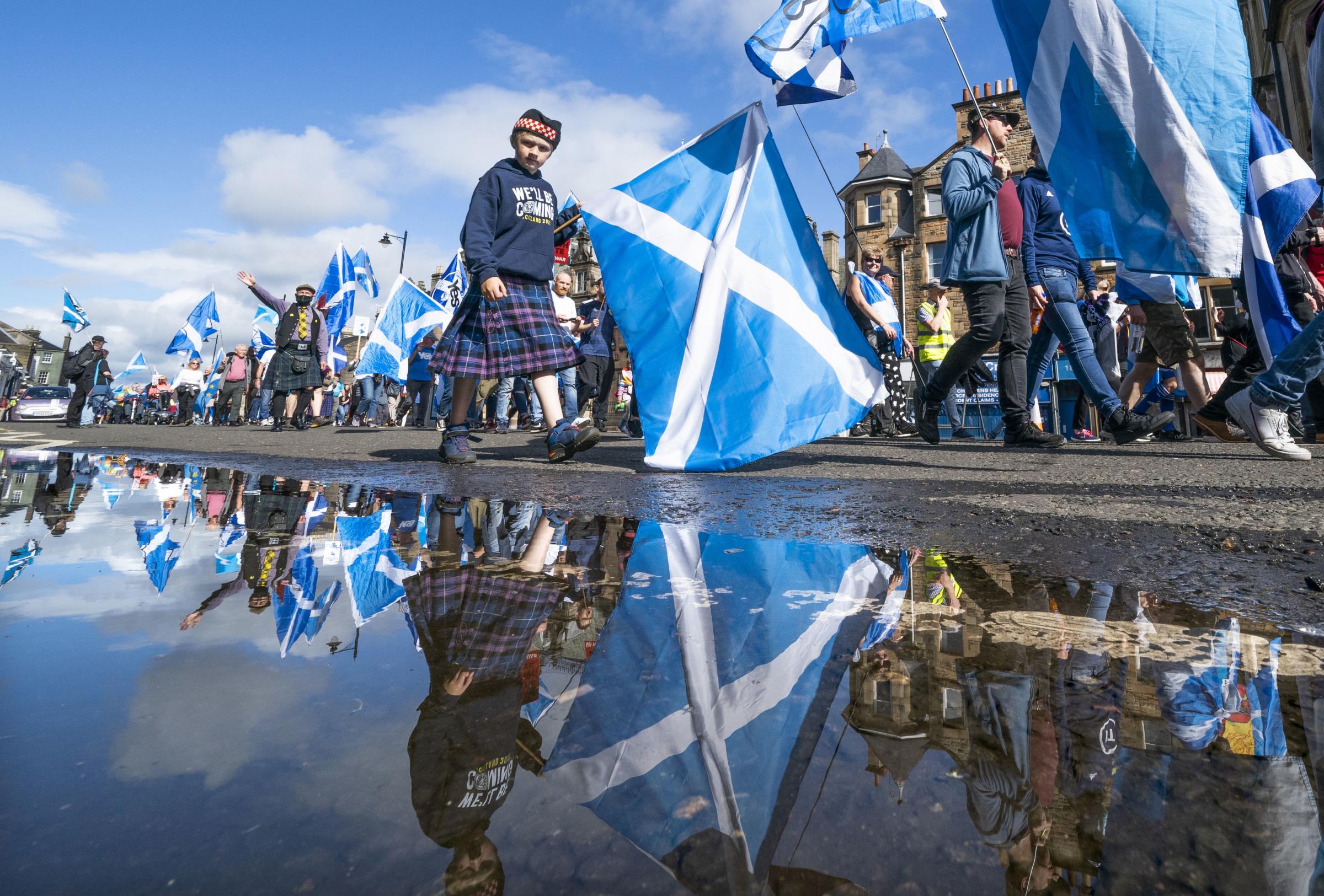
YES and No are “practically neck and neck” as the Scottish Government gears up for a referendum in 2023.
However, the Savanta ComRes poll for The Scotsman found a majority of voters are opposed to holding the ballot next year.
Nicola Sturgeon announced plans this week for a second vote on the issue on October 19, 2023.
With the UK Government refusing to grant consent for such a ballot to be held, the First Minister is asking UK Supreme Court judges to rule if Holyrood can hold a referendum without the backing of Westminster.
If the court rules the ballot cannot take place, the next Westminster election will be considered by the Scottish Government to be a “de-facto” referendum on Scotland’s place in the UK.
Some 44% of those questioned by Savanta ComRes support independence, while 46% are opposed, both down 1% from a survey last month, while 10% were undecided, which was up three percentage points.
When undecided voters were removed, 49% said they would vote Yes, while 51% said they would vote No, which was unchanged.
🚨NEW #indyref2 voting intention for @TheScotsman ✅ Yes 44% (-1) ❎ No 46% (-1) ❓ Undec. 10% (+3) w/o Undec. ✅ Yes 49% (=) ❎ No 51% (=) 1,029 Scottish adults, 23-28 June (change from 26 Apr - 3 May) pic.twitter.com/J7BnAFNKlu
— Savanta ComRes (@SavantaComRes) June 30, 2022
The study also found 53% of respondents opposed holding a referendum next October, while 40% were in favour. The remainder were undecided.
Savanta ComRes associate director Chris Hopkins told The Scotsman that the results on the question of whether Scotland should be an independent country are “practically neck and neck”.
He said: “Support for a second independence referendum without a Section 30 is driven by those in the Yes camp; opposition comes almost wholly from the No camp.
“Four in five Yes voters say the case for independence is stronger now than in 2014, a majority of No voters say it’s weaker now.
“The battle lines that were drawn in 2014 are all too familiar, and Nicola Sturgeon’s defiance to hold a referendum at almost any cost just deepens this divide.”

The polling firm interviewed 1029 Scottish adults aged 16 or over online between June 23 and 28.
They were also asked about their Westminster voting intentions. It comes as the First Minister clarified her belief that, in the event of the next General Election being considered a “de facto” referendum, pro-independence parties would have to win more than 50% of the popular vote to secure a mandate to begin negotiations to leave the Union.
Sturgeon told BBC Scotland on Wednesday evening "that Scotland cannot become independent unless and until a majority of people in Scotland vote for independence".
Some 45% of respondents said they would back the SNP – no change from the 2019 General Election. A further 25% (+6) opted for Labour while Conservative support plummeted by seven points to 18%. The LibDems were backed by 8% (-2).
At the 2019 General Election, while the SNP won 45% of the votes cast in Scotland, the pro-independence Greens also won a further 1%.
In their best ever UK election showing in 2015, the SNP won 50% of Scottish votes.
Unionist figures have suggested they could boycott a referendum if it is held without Westminster's consent. Sturgeon insists a vote will only be held if it is proven to be legal.
Two-thirds (67%) of respondents to the Savanta ComRes poll say they would vote in a referendum held without a Section 30 order – a mechanism which grants Holyrood the power to stage a vote.
Some 57% of No voters say they would take part in such a vote, with 90% of Yes voters keen to take part.
A total of 17% of respondents said they would not vote, while 15% were undecided.
The First Minister retained the highest favorability rating among Scottish leaders, on +15.
Labour's Anas Sarwar is the only other leader with a net positive rating, on +3. LibDem leader Alex Cole-Hamilton is on -11, as are Scottish Green co-chiefs Lorna Slater and Patrick Harvie.
Douglas Ross lagged behind on -26, while Alex Salmond was a distant last on -61.
🚨Net favourability ratings of Scottish leaders for @TheScotsman Sturgeon +15 Sarwar +3 Cole-Hamilton -11 Harvie -11 Slater -11 Ross -26 Salmond -61 pic.twitter.com/BNTy25GDrN
— Savanta ComRes (@SavantaComRes) June 30, 2022
Commenting on the poll, a UK Government spokesman said: “We are clear that now is not the time to be talking about another independence referendum.
“People across Scotland want to see both of their governments working together on the issues that matter to them.
“That includes tackling the cost of living, ensuring energy security, leading the international response against Russia’s invasion of Ukraine, and growing our economy. That remains our priority.
“A decision has been taken by the First Minister to publish a Bill, and the Lord Advocate has made a referral to the Supreme Court. UK Government law officers will now consider their response.”







